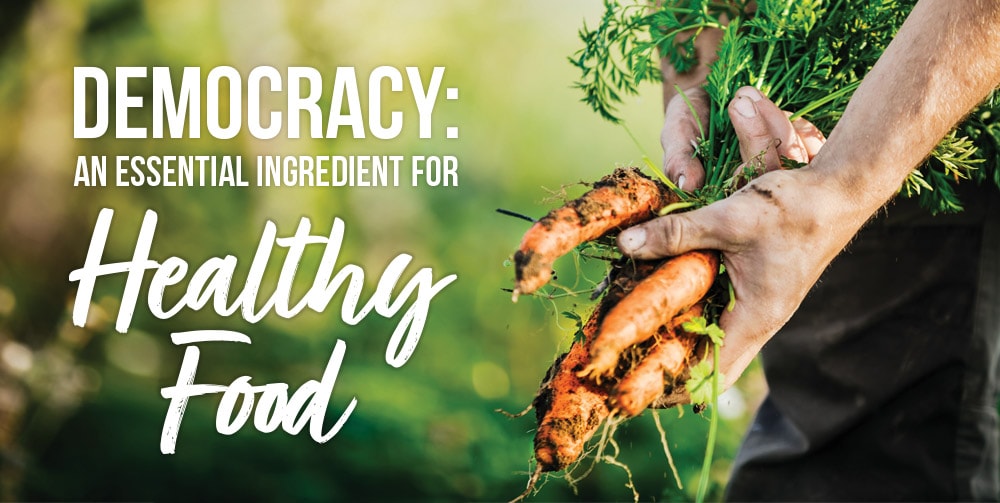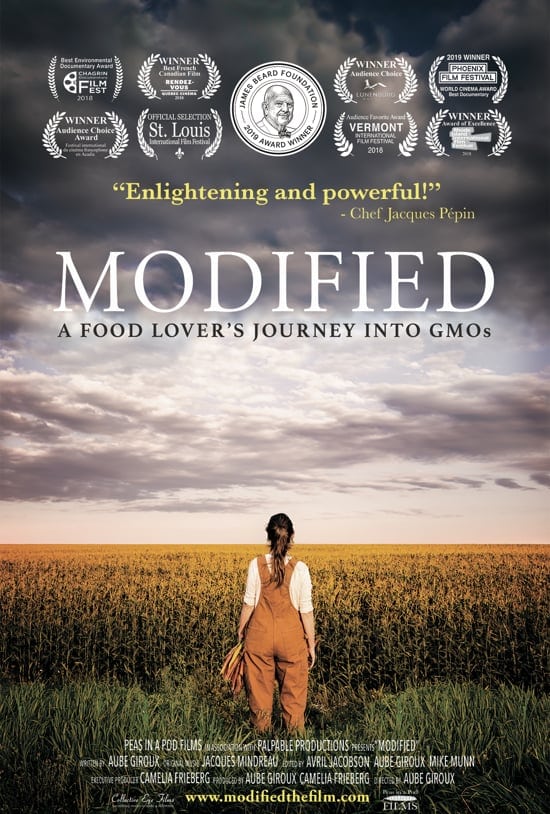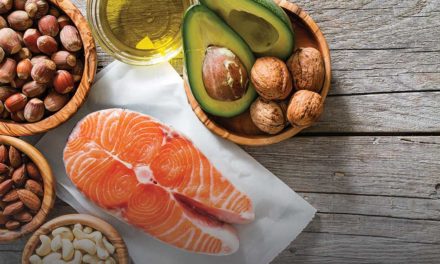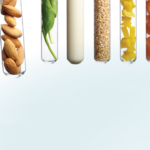
Note from the editor: We recently watched a film that increased our desire to share with our readers that the time has come to start making purchasing decisions with a strong concern for our planet. We are honoured to have the award-winning filmmaker, Aube Giroux, grace the cover of WV and share the story of making the film Modified – A Food Lover's Journey Into GMOs.
My earliest memories are in my mom’s garden. It has always been my “happy place.” It’s where my mom first showed me the pleasures of plucking a tender pea pod off the vine, and savoring a freshly picked strawberry, its juices still warm from the sun. It’s where she taught me about resilience, self-sufficiency, and how food tastes so much better when we know the story behind how it was grown.
After she passed away from cancer in my early thirties, my mom’s garden became my place of comfort, a refuge where I could let the wind wash away my grief and feel her presence all around me, in every plant, and every bird song. So, it’s fitting that my documentary film, Modified, begins in her garden.
Seeds Under Threat
For as long as I can remember, my mom practiced the age-old tradition of seed saving. Like farmers have done for thousands of years, she saved and replanted her own seeds each year. In the mid-1990s, an entirely new kind of seed came on the market: corn varieties genetically modified to produce insecticide from within the plant, and soybeans engineered to survive the spraying of herbicides. Farmers in our neighborhood started to grow these new crops (known as GMOs), but my mom had concerns.
Would these crops actually lead to reduced pesticide use and higher yields as the companies selling them claimed? Could they inadvertently cross-pollinate with the plants in her garden, thereby imparting their lab-created genetics? Perhaps what bothered her most was that some of the world’s largest chemical companies had created these new crops and then placed patents on them. This meant that farmers growing them had to pay higher prices for the patented seeds and sign technology license agreements promising never to save or replant them, thus forcing farmers to purchase from the companies year after year.
My mom believed that seeds belong in the hands of people, and should not be owned and controlled by the world’s largest multinational corporations. She also believed that we all have a right to know how our food is produced. Yet, unlike many countries around the world, the United States and Canada decided not to label GMOs on food products.
My mom believed that seeds belonged in the hands of people, and should not be owned and controlled by the world’s largest multinational corporations.
Our Right to Know
When I started the film, I had just returned home after two years of living in Europe. I had witnessed how Europeans took a more cautious approach to approving new GMOs and mandated that they be labeled on food products. My time in Europe had solidified my passion for cooking, as well as my curiosity to better understand how our meals get to our dinner plates. Upon returning to North America, I had many unanswered questions about the foods in our grocery store aisles.
For instance, why were Kellogg’s cornflakes manufactured with GMO corn here, but produced with non-GMO corn for the European market? Why was the Canadian government repeatedly voting against the labeling of GMOs despite overwhelming support from the vast majority of Canadians? And why were American states unable to pass GMO labeling laws despite massive citizen-led campaigns and polls showing the majority of people wanted the right to choose? These were the questions that led me on my filmmaking journey with Modified.
Our Democracy at the Mercy of Industry Interests
During the 10 years it took me to make this film, I learned that the agribusiness and the food industry have spent more than 400 million dollars to fight against GMO labeling legislation in the United States. I learned about the very cozy relationship between the agribusiness industry and our governments, including a revolving door that sees Big Ag executives move into government positions, and vice versa. I also learned that our governments and regulatory agencies are often controlled by the industries they are meant to be regulating. I had started off making a film about food, but it ended up becoming a film about democracy.
Proper regulations should protect the well-being of citizens. The World Health Organization (WHO) addresses the safety of GMOs as follows: “Different GM organisms include different genes inserted in different ways.
This means that individual GM foods and their safety must be assessed on a case-by-case basis and that it is not possible to make general statements on the safety of all GM foods.” Therefore, generalized claims such as “all GMOs are safe” or “all GMOs are dangerous” are inaccurate. Instead, the risks of each individual GMO need to be carefully assessed case by case, and this can only be done through a robust and functional regulatory system that operates at arms-length from the industry.
A Lesson Learned from Canada
In 1999, just four years after the first GMOs entered the food supply, the Canadian government asked the country’s most eminent body of academics and scientists – the Royal Society of Canada – to engage in a thorough assessment of the Canadian GMO regulatory system. The result was a 245-page report, released in 2001, which uncovered a profound lack of transparency and scientific rigor within the regulatory system. The Toronto Star described the report as “a polite but scathing indictment” of the industry and the government. The report showed that our regulatory system is designed to benefit the agribusiness industry rather than protect the public interest.
When a new GMO product comes on the market, Health Canada evaluates the studies provided by the company that produced it. It does not conduct any independent testing. Further, its assessment of the industry science is done behind closed doors. Neither the industry studies, nor the Canadian government’s assessments are peer-reviewed. The Royal Society’s expert panel recommended an overhaul of the regulatory system by way of 53 recommendations – intended to make GMO regulations more transparent, scientific, and democratic. But almost 20 years after the report was published, the Canadian government has only implemented two of its 53 recommendations.
A Fake GMO Labelling Law in the United States
In the United States, individual states that have tried to pass GMO labeling laws have been met with an onslaught of anti-labeling ad campaigns and lobbying from the agribusiness industry to defeat them. Despite this, on July 1, 2016, Vermont became the first state to succeed in implementing a GMO labeling law. Food companies began to label GMOs on food products at the national level, to avoid having to create unique packaging just for Vermont. However, Vermont’s law was short-lived. Only one week after its implementation, Congress passed federal legislation banning any state from having a GMO labeling law, overturning Vermont’s hard-fought law. The new federal law claimed it would mandate the disclosure of GMOs at the national level.
 But the law (developed with heavy lobbying from industry) is so full of loopholes that many food organizations called it the D.A.R.K. Act (Deny Americans Right to Know). This past January 2020 marked the voluntary implementation of the law, officially titled “The National Bioengineered Food Disclosure Law,” though companies have until January 2022 to comply. Many have dubbed it a “fake GMO labeling law” since most GMOs won’t be labeled under it, due to its numerous loopholes. The agribusiness industry had, after all, spent 192.8 million dollars between 2013 and 2015 to influence its outcome and keep Americans in the dark, while continuing to profit from GMOs.
But the law (developed with heavy lobbying from industry) is so full of loopholes that many food organizations called it the D.A.R.K. Act (Deny Americans Right to Know). This past January 2020 marked the voluntary implementation of the law, officially titled “The National Bioengineered Food Disclosure Law,” though companies have until January 2022 to comply. Many have dubbed it a “fake GMO labeling law” since most GMOs won’t be labeled under it, due to its numerous loopholes. The agribusiness industry had, after all, spent 192.8 million dollars between 2013 and 2015 to influence its outcome and keep Americans in the dark, while continuing to profit from GMOs.
The agribusiness and the food industry had spent more than 400 million dollars to fight against GMO labelling legislation in the united states.
Informed Food Choices Are Part of a Healthy Democracy
Eating is an intimate, personal act, and we make food choices based on many factors, namely our religious or cultural backgrounds, our ethical and environmental concerns, or simply our personal tastes. A technology that fundamentally changes the makeup of what we eat is worthy of discussion and should be a personal choice.
When governments refuse to provide fundamental transparency about how our food is produced, we have to wonder whose interests are being served? Our governments’ failure to listen to their citizens on this issue points to the broader problem of regulatory capture, whereby our regulatory institutions and governments, which should act in the public interest, instead, advance the commercial interests of the industries whose products they are in charge of regulating. Sadly, this phenomenon is not limited to the agribusiness industry. It is endemic across the corporate sector including the pharmaceutical, tobacco, oil and gas, aviation, and chemical industries.
Six billion pounds of pesticides are sprayed each year across the globe. Our farmland is now 48 times more toxic than it was 25 years ago.
Corporate Interests Should Not Come First
Six billion pounds of pesticides are sprayed each year across the globe and the use of glyphosate-based herbicides has risen over 15-fold since GMOs entered the market. Our farmland is now 48 times more toxic than it was 25 years ago. We have pesticide residues in our drinking water, air, food, and in our bodies. Scientists estimate that close to 200 species of plants, insects, birds, and mammals become extinct every day and have linked much of this species loss to pesticide use. This rate of extinction is nearly 1,000 times the natural rate, and has not been seen since the vanishing of the dinosaurs millions of years ago. We are in a climate emergency and the beginning of mass extinction.
“With every meal we eat, we’re making a choice about the kind of world we want to live in and the kind of agriculture we wish to support.”
If we want to adequately address these urgent problems, we need to force our governments to place public interest ahead of corporate profits. Yet currently, for every member of Congress in the United States, there are two Big Pharma lobbyists. Every year, the world’s five largest oil and gas companies spend around $200 million on lobbying to delay or block binding climate policy. The recent death of 346 people in two Boeing Max 737 plane crashes could have been avoided if Boeing had not been allowed to regulate its own airplanes. The tobacco industry spent millions of dollars fighting public health policies when medical science knew of the dangers of smoking. Volkswagen purposely designed its cars to cheat emissions regulations testing, and didn’t stop until they got caught. Monsanto (owned by Bayer) continues to legally challenge victims who got sick from using the herbicide Roundup. Dupont knew about the dangers of PFOAs and did nothing. History has shown us that companies will cheat, lie, and jeopardize public safety to increase their profits unless governments are watching closely and regulating carefully.
To secure a healthy future for our planet and the generations to come, we must elect government officials who can resist bowing to the world’s most powerful corporate interests and ensure our regulatory agencies are transparent and fully independent from industry.
My sincere hope is that my film Modified will motivate people to take action to transform our food system. A different world is possible. We see it in the colors and textures at our local farmers’ markets, in the abundance of pollinators and birdlife on organic farms, and in the incomparable flavor of food grown without toxic chemicals and the seeds genetically engineered to withstand them. My mom said it best and my film ends on her words, “With every meal we eat, we’re making a choice about the kind of world we want to live in and the kind of agriculture we wish to support.”
64 countries label GMOs
90% of Canadians and Americans want GMOs labelled too so that they can make an informed choice at the grocery store.
How can I Take Action?
- Know your farmer! Shop at your local farmers market.
- Choose organic! Support your local organic farmers. The more we support organic agriculture, the more it will become a viable livelihood for farmers and the healthier our agriculture system (and our bodies) will become.
- Most GMOs and heavily sprayed monoculture crops such as corn and soybeans are used in livestock feed. Choose 100% grass-fed or organically fed animal products when it comes to meat, dairy, and eggs. Or opt for organically produced plant-based alternatives.
- Food is political! Get politically involved and support candidates committed to getting big money out of politics and stopping industry from regulating itself.
- GMOs are not the only crops sprayed with Roundup herbicide. Grains (such as wheat and oats) and legumes (such as beans, chickpeas, and lentils) are often sprayed with Roundup in the days right before harvest. Choose organic!
- Let companies know you care. Call the 1-800 number on food packages or write to companies to let them know you want GMOs clearly labeled, and foods that are free of pesticides, antibiotics, and other harmful residues.
- Host a film screening or bring in a speaker. Find ways to talk about these issues in your community.
- Grow your own food! Plant a garden and compost your food waste. Even if it’s just a few tomato plants and herbs on your patio, you can enjoy fresh food and know how it was grown.
Quick Facts about the Film
 Modified has been shown at over 70 international film festivals and has received 15 awards including the 2019 James Beard Foundation Award for Best Documentary. It is available on DVD and for online rental at: modifiedthefilm.com
Modified has been shown at over 70 international film festivals and has received 15 awards including the 2019 James Beard Foundation Award for Best Documentary. It is available on DVD and for online rental at: modifiedthefilm.com
Aube Giroux is the writer, director, and producer of Modified. She is also an avid gardener and the creator of the acclaimed PBS food blog and cooking show, Kitchen Vignettes, which features whimsical and thought-provoking video recipes from farmers’ fields and kitchens. Watch Kitchen Vignettes at: pbs.org/kitchenvignettes and follow Aube’s food adventures on Instagram at @kitchenvignettes












